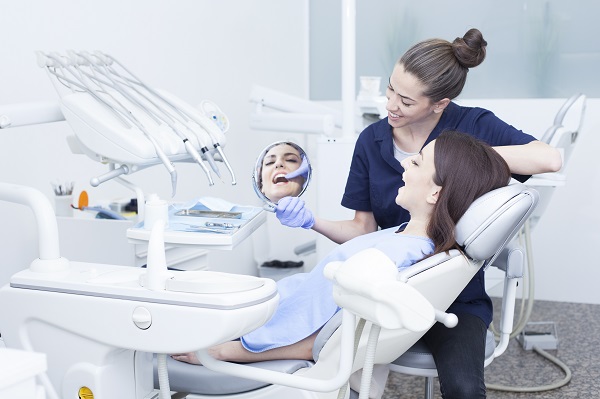Quick Guide to All-on-4® Dental Implants

While dental implants have been used for decades to replace missing or extracted teeth, All-on-4® implants are a newer development used to substitute an entire arch of teeth. This solution is an alternative to traditional removable dentures and is designed for patients who have lost a majority of their teeth due to gum disease or another cause.
The All-on-4® procedure
Read on for common questions and essential information for anyone considering this dental procedure.
Who is a candidate?
This treatment is acceptable for healthy patients of all ages who have widespread damage to the teeth or who are currently wearing removable dentures. It is also important that a patient’s jawbone has enough bone to support the implants. If a 3D CT scan reveals there is not an adequate foundation to proceed with the procedure, a bone graft may be needed ahead of time to strengthen the jaw structure.
What happens during the surgery?
All-on-4® implants involve a full prosthetic bridge secured to the jawbone with four strategically placed titanium implants. The gum-like base of the prosthetic is most often made from acrylic, and the teeth are made from resin or porcelain. This arch is prepared prior to the patient’s appointment by dental lab technicians.
While the exact process varies depending on the patient’s unique situation and the office’s protocol, it is not uncommon for a person to have any teeth extracted, implants placed and prosthetic placed all in one day. Some offices may provide the patient with temporary dentures during a three- to five-month healing process and then schedule a second appointment for attaching the permanent bridge.
What is required for aftercare?
Patients need time to recover after surgery and may experience discomfort in the days following the procedure. People often take several days off work to rest and heal. Rinsing with salt water every few hours is recommended to minimize bleeding. The patient should stick to a soft diet for at least a week or two.
Facial swelling and bruising in addition to minimal bleeding from the surgical area is to be expected. There are several other common issues a person may experience:
- Nausea and lightheadedness
- Sharp feelings in the mouth due to protruding bones
- Stiff jaw muscles
- Dry lips
- Sore throat
Patients should contact a dentist if they are bleeding excessively from the site or experiencing extreme pain. Any signs of infection or improper healing needs to be addressed immediately. While rare, it is possible for the implant to fail due to a variety of reasons. Loosening of the implant, gum recession or swelling and problems chewing are all signs of a failed implant.
Conclusion
For patients who meet the qualifications necessary for All-on-4®, it is possible to get a whole new arch of teeth in one visit. A comprehensive consultation is necessary to determine the right course of treatment for each individual patient. Getting in contact with a dentist is the first step in determining if this is the appropriate restorative option for your missing or damaged teeth.
Are you considering All-on-4 in the Atlanta area? Get more information at https://atlantapamperedsmiles.com.
Check out what others are saying about our services on Yelp: Read our Yelp reviews.
Recent Posts
If you are looking for a tooth replacement method, you may want to consider a partial denture for one missing tooth. Although it may be tempting not to replace a tooth, especially if the gap is in the back and is hard to see, there are various consequences of not doing so. Although there are…
For patients who want to replace a damaged or lost tooth without undergoing invasive dental work, a partial denture for one missing tooth can be an excellent alternative. This dental appliance helps restore the look and function of the natural tooth and is completely removable for cleaning and maintenance. In fact, it is important to…
Teeth whitening has become a go-to cosmetic treatment for those looking to brighten their smile. With so many options available, it can be tough to choose the best one. Over-the-counter options can be convenient, but they have their drawbacks. Thankfully, professional teeth whitening treatments offered by dentists provide a safe, effective, and personalized way to…
For anyone who has a gap in their smile due to a missing tooth, a partial denture for one missing tooth can restore confidence. Dentures are commonly placed for aesthetic purposes, but there are two other reasons you should not hesitate to replace a missing natural tooth with a partial denture.You can get partial dentures…


